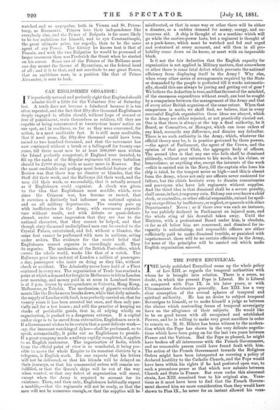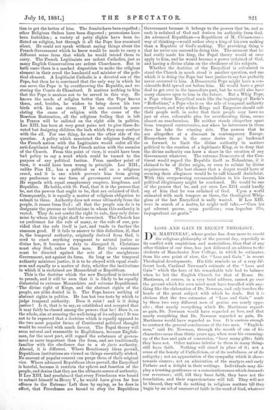THE POPE'S ENCYCLICAL.
THE lately published Encyclical sums up the whole policy of Leo XIII. as regards the temporal authorities with whom he is brought into relation. There is a sense, no doubt, in which the present Pope is Liberal. He is Liberal as compared with Pius IX. in his later years, or with Ultramontane doctrinaires generally. Leo XIII. has a very clear conception of the several spheres of temporal and spiritual authority. He has no desire to subject temporal Sovereigns to himself, or to make himself a judge as between the claims which contending forms of temporal sovereignty have on the allegiance of their subjects. He would like to be on good terms with all recognised and established Powers, and he is willing to make very great sacrifices in order to remain so. M. St. Hilaire has borne witness to the modera- tion which the Pope has shown in the very delicate negotia- tions which have been going on for the last two years between France and the Vatican. Had the Pope so pleased, he might have broken off all intercourse with the French Government, and no reasonable person could have found fault with him. The action of the French Government towards the Religious Orders might have been interpreted as covering a policy of declared hostility to the Catholic Church, and the Pope would have been within his rights if he had preferred open war, to such a precarious peace as that which now subsists between Church and State in France. But even under this abnormal strain, Leo XIII. remained true to his original aim. Vexa- tious as it must have been to find that the French Govern- ment showed him no more consideration than they would have shown to Pius 1X., he never for an instant allowed his vim-
tion to get the better of him. The Jesuits have been expelled ; other Religious Orders have been dispersed ; processions have been forbidden ; a variety of petty slights have been in- flicted on religion, but through it all the Pope has remained silent. He could not speak without saying things about the French Government which he knew would be made to carry a different sense from that which he would intend them to carry. The French Legitimists are ardent Catholics, just as many English Conservatives are ardent Churchmen. But in both cases there is a marked disposition to make the religious element in their creed the handmaid and minister of the poli- tical element. A Legitimist Catholic is a devoted son of the Pope, but then he is convinced that the only way in which he can serve the Pope is by overthrowing the Republic, and re- storing the Comte de Chambord. It matters nothing to him that the Pope is anxious not to be served in this way. He knows the needs of religion better than the Pope knows them, and, besides, he wishes to bring down his two birds with his one stone. If he can succeed in asso- ciating the cause of religion with the cause of the Bourbon Restoration, all the religious feeling that is left in France will be enlisted on the right side in politics. Leo XIII. has been at very great pains not to give these de- voted but designing children the inch which they may confuse with the ell. For one thing, he sees the other side of the question. A policy which associated the religious feeling of the French nation with the Legitimists would enlist all the anti-Legitimist feeling of the French nation with the enemies of the Church. From this point of view, it would have been bad policy to say a word which could be turned to the purpose of any political faction. From another point of view, it. would have been wrong in principle. Leo XIII., unlike Pius IX., has a political as well as a religious creed, and it is one which prevents him from giving any preference to one form of government over another. He regards with equal complacency empires, kingdoms, and Republics. He holds, with St. Paul, that it is the powers that be, not the powers that ought to be, that are ordained of God. Consequently, it is equally a matter of religious obligation to submit to them. Authority does not come ultimately from the people, it comes from God ; all that the people can do is to designate the persons or institutions in whom this authority is vested. They do not confer the right to rule, they only deter- mine by whom this right shall be exercised. The Chinch has no preference for the rule of many, or the rule of one, pro- vided that the rule itself is just, and tends to further the common good. If it fails to answer to this definition, if, that is, the temporal authority, originally derived from God, is used to exact anything repugnant to natural justice or divine law, it becomes a duty to disregard it. Christians must obey God, rather than man. But their resistance must be directed against the acts of the unrighteous Government, not against its form. So long as the temporal authority ministers justice, it is to be obeyed with equal readi- ness and equally as a matter of duty, whether the institutions in which it is enshrined are Monarchical or Republican.
This is the doctrine which the new Encyclical is intended to preach, and it will be seen that it is likely to be equally distasteful to extreme Monarchists and extreme Republicans. The divine right of Kings, and the abstract rights of the people, are alike denied in it. The pope knows nothing of abstract rights in politics. He has but two tests by which to judge temporal authority. Does it exist? and is it doing -justice ? Is it, that is to say, so established and accepted that it may fairly be classed among the powers that be? Does it, on the whole, aim at securing the well-being of its subjects ? It was not to be expected that a doctrine which is equally opposed to the two most popular forms of Continental political thought would be received with much favour. The Papal theory will seem natural and reasonable to Englishmen, because English- men, for the most part, still regard the substance of govern- ment as more important than the form, and are traditionally familiar with the obedience due to a de facto authority. Abroad, it is different. Where Reactionary ideas prevail,, Republican institutions are viewed as things essentially wicked. No amount of popular consent can purge them of their original vice. Where advanced Republican ideas prevail, the Encyclical is hateful, because it restricts the sphere and function of the people, and denies that they are the ultimate source of authority. If Leo KILL had proclaimed that every Frenchman was bound to submit himself to Henry V., he would have given far less offence to the Extreme 'Left than by saying, as he does in effect, that Frenchmen are bound to obey the Republican Government because it belongs to the powers that be, and as such is ordained of God and derives its authority from God. An advanced Republican—a Republican of M. CWtnenceau's way of thinking—would rather obey a king of his own making than a Republic of God's making. The provoking thing is that he never can succeed in doing this. The moment that he had really made his king, the Papal theory would at once apply to him, and he would become a power ordaine.d of God, and having a divine claim on the obedience of his subjects.
Whether the doctrine of the Encyclical is calculated to stand the Church in much stead is another question, and one which it is doing the Pope but bare justice to say has probably never occurred to him. A Democratic Pope might have a con- siderable field spread out before him. He would have a great deal to get over in the immediate past, but he would also have many chances open to him in the future. But a Whig Pope, a Pope whose Encyclical reads like the beginning of Burke's "Reflections," a Pope who is on the side of temporal authority everywhere, and who wishes Kings and Emperors should rule their people well, in order that their people may have no just or even colourable plea for overthrowing them, seems almost an anachronism. He neither stands altogether apart from temporal controversies, nor when he intervenes in them does he take the winning side. The powers that be are altogether at a discount in contemporary Europe. Everywhere there is the same desire to go backward or forward, to limit the divine authority in matters political to the creation of a legitimate King, or to deny that the divine authority can have a share in the creation of any Government whatever. The extreme Democrats of the Con- tinent would regard the Republic itself as Nehushtan, if it claimed to be of divine origin, or even to subsist by divine acquiescence. The best chhnce that a despot would have of securing their allegiance would be to call himself Antichrist. With this overpowering recommendation in his favour, his political illegitimacy might be condoned. Ile would be one of the powers that be, and yet even Leo XIII. could hardly say of him that he was ordained of God. Upon a world animated with such tempers as these, the theological Whig- gism of the last Encyclical is sadly wasted. If Leo XIII. were in search of a motto, he might well take,—" Cum his qui oderunt pacem, cram pacificus ; cum loquebar itnpugnabant me gratis."



































 Previous page
Previous page